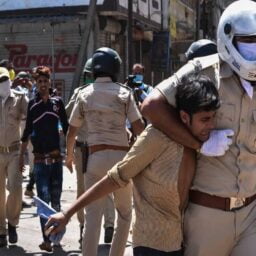INTRODUCTION
Starting from vaccine demands to manufacturing our vaccine to rage over vaccine scarcity, India has seen it all. Covaxin, developed by Bharat Biotech and Covishield developed by the Serum Institute of India are the only indigenous vaccines approved in India and use effectively.
The approval of vaccines is governed by the New Drugs and Clinical Trial Rules introduced in March 2019. They are approved after proper analysis of multiple phase trials of the vaccines.
Earlier this year momentous promises regarding vaccination programs were made with several awareness programs and online services being made available for easy booking, that is the Cowin application, for the easy and fast delivery of Vaccines, However, unfortunately, abrupt stops and interruptions happened with lack of vaccines in several states, resulting in citizens scrambling to other states to take their second doses before the necessary time limit between two doses of vaccines ends.
This sparked outrage among the public and bashing on the government over the supply of first doses of vaccine without proper ensuring of availability of second doses over the limited time frame. Eventually, many states stopped their vaccination programs.
The country seeks for the supply of foreign vaccines and has been in talks with various vaccine manufacturing entities out of which the Russian developed Sputnik V has been allowed manufacturing in India under Dr Reddy’s Laboratories.[1]
US-developed Moderna and Pfizer vaccines are still in talks with the Government of India regarding supply to the Indian subcontinent and it has been reported that the signing of commercial contracts between the countries is taking this long due to conflict over the establishment of indemnity clause demand by the manufacturers.[2]
WHAT IS INDEMNITY IN THE LEGAL CONTEXT?
Section 124 of the Indian Contract Act’1872 defines Contract of Indemnity as “a contract by which one party guarantees to save the other person from loss caused to him by the action of the guarantor himself, or by the action of any other person.”
In layman’s terms, indemnity is defined as “a duty to make good any loss, damage, or liability incurred by another,” according to Blackman’s Law Dictionary.
For example, Tom (principal debtor) wants a loan from the bank(the creditor) and in case of Tom’s default for paying due to any reason, John will pay(indemnifier/guarantor).
The fundamentals of indemnity include:
- It is a legal promise to hold security for or compensate for losses, damage or injury.
- In a broad sense, it includes all contracts of guarantee and insurance. It is not entirely collateral but an independent contract.
- It is a tool for assigning risks contingent responsibility.
- The indemnity clauses should be specific and clear. They must precisely mention all the necessary details and circumstances under which indemnity will arise. It should be considered in light of any expulsion of liability clauses found anywhere in the agreement and should state what damages will be payable in the occurrence of the clause being favourably conjured.[3]
INDEMNITY CLAUSE AND VACCINE PROCUREMENT: WHAT’S THE ISSUE?
On May 30th, Pfizer reported that negotiations with the government of India is still going on and they can’t release more details amid the reports regarding that India may grant indemnity to Pfizer and Moderna to ensure their export to India.[4]
Why does the indemnity clause hold so much importance to the respective vaccine manufacturers while signing contracts?
Since indemnity shifts the liability to a third party and provides protection coverage to the indemnity holder that is the principal debtor, this clause acts as protection to vaccine makers from legal proceedings.
Vaccines have approval for mass use from required entities, however, in case of extreme medical exigencies which are directly or indirectly related to vaccine doses, there’s a good chance of the company getting sued by the affected vaccine receiver. Therefore, to avoid such legal proceedings which can lead to compensation demands and risking of the company’s reputation, an indemnity clause is introduced in contracts for receiving vaccine supplies. This frees the company from liability.
Why India is reluctant to sign the indemnity clause?
Indian manufactured vaccines, covaxin, covishield and the new to be produced Sputnik V, have not been granted against compensation due to extreme side effects by The Indian drug regulator.[5]
However, Pfizer and Moderna have been granted indemnity by other countries where it has been supplied including its parent country the US as well as in the UK. It’s possible that India can grant indemnity under these lines highlighting emergency needs.
Although in doing so, the resultant event could be the other vaccines such as Covaxina and covishield which haven’t been granted the same clause can start demanding the government of India for the grant. Also, by doing so, it shifts the responsibility for liability on the government rather than the company and manufacturers.
Is there any compensatory mechanism for the aggrieved severely affected directly or indirectly by the vaccine?
Among all the hush-hush of India examining the indemnity clause in foreign vaccine contracts, it should be noted that India itself has no specific provisions under the Drugs and Cosmetic Act for compensation, once the vaccine is approved for commercial use.
What the beneficiary looking for compensation can do, is to file petitions in front of legal forums which can include consumer courts or high courts. Also, the drug regulator can take action under the law for violation of any clause when a registration certificate is granted for the import of vaccines.[6]
WHO, in February, introduced a “No-Fault compensation programme” for Covid-19 vaccines for 92 low- and middle-income countries. It is funded by a small levy on each dose supported by the Gavi COVAX Advance Market Commitment. This programme is only available for those who are severely and adversely affected by COVAX-distributed vaccines until June 2022. So far, this is the only vaccine injury compensation program available.
It covers serious injury or illness that is suffered by a patient and that: “requires hospitalisation or prolongs an existing hospitalization, and results in permanent impairment; or is a congenital birth injury or illness in an unborn or newborn child of a woman who received a vaccine and results in permanent total or partial impairment; or results in death.”
CONCLUSION
India has successfully developed two vaccines for its citizens, however, considering the high population and high societal dividend, availing vaccines to the whole of the country will take much more than a year and of course, a lot more than just relying on two vaccine supply. The vaccine procurement needs to be widened and that includes exporting it from other countries if the country wants to see the necessary change in the covid situation.
The suggestion should be to treat these contracts as any business contracts and receive the required supply of Covid vaccines considering the recently rising cases after relaxation owing to the slow down of the second wave. The country needs should be seriously calculated and acted accordingly by the Government of India before it’s too late.
Author(s) Name: Gargi Gouri (Student, National Law University, Odisha)
References:
[1] ‘Sputnik Vaccine Registration, Efficacy, Price, Side Effects, Dose Gap’ (My Personal News for Recruitment and Counselling – MPNRC.Org, 2021) <https://www.mpnrc.org/sputnik-vaccine-registration-efficacy-price-side-effects-dose-gap/> accessed 20 July 2021.
[2] ‘Explained: What Is Indemnity For Vaccine Makers? What Pfizer, Govt Say About It’ (hindustantimes.com, 2021) <https://www.hindustantimes.com/india-news/what-is-indemnity-for-vaccine-makers-what-pfizer-govt-say-about-it-101622638336579.html> accessed 20 July 2021.
[3] ‘Indemnity In A Contract’ (Legalservicesindia.com, 2021) <http://www.legalservicesindia.com/article/379/Indemnity-in-a-contract.html> accessed 20 July 2021.
[4] Supra Note 2
[5] Kunain Sherrif, ‘Explained: Covid-19 Vaccine Makers And Indemnity’ (indianexpress.com, 2021) <https://indianexpress.com/article/explained/explained-vaccine-makers-and-indemnity-7374643/> accessed 20 July 2021.
[6] ibid
















